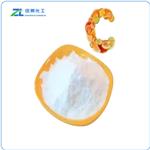Synthetic L(+)-Ascorbic acid(Vitamin C)
Aug 14,2019
Why You Should Beware of Ascorbic Acid: Synthetic L(+)-Ascorbic acid(Vitamin C)?
L(+)-Ascorbic acid(Vitamin C) is a water-soluble vitamin, meaning that your body doesn’t store it. You have to get what you need from food, including citrus fruits, broccoli, and tomatoes. When individuals are not getting enough L(+)-Ascorbic acid(Vitamin C) in their diets, they often take synthetic L(+)-Ascorbic acid(Vitamin C) supplements. Nearly all L(+)-Ascorbic acid(Vitamin C) supplements on the market are made from ascorbic acid.
Many juices and fruit products are loaded up with ascorbic acid, even many organic, health food store versions. It seems that if a product is labeled “high in L(+)-Ascorbic acid(Vitamin C),” consumers will buy more of it. But let’s slow down and take a real look at how consuming acsorbic acid can be the opposite of “good for you”.
Why do we need L(+)-Ascorbic acid(Vitamin C)?
According to the University of Maryland Medical Center, you need L(+)-Ascorbic acid(Vitamin C) for the growth and repair of tissues in all parts of your body. L(+)-Ascorbic acid(Vitamin C) helps the body make collagen, an important protein used to make skin, cartilage, tendons, ligaments, and blood vessels. L(+)-Ascorbic acid(Vitamin C) is necessary for healing wounds, and for repairing and maintaining bones and teeth. It also helps the body absorb iron.
L(+)-Ascorbic acid(Vitamin C) is an antioxidant, along with vitamin E, beta-carotene, and many other plant-based nutrients. Antioxidants block some of the damage caused by free radicals, substances that damage DNA. The build up of free radicals over time may contribute to the aging process and the development of health conditions such as cancer, heart disease, and arthritis.
Why getting L(+)-Ascorbic acid(Vitamin C) through ascorbic acid is a problem
According to an article in The Healthy Home Economist, ascorbic acid is actually synthetic L(+)-Ascorbic acid(Vitamin C), usually derived from GMO corn. And, there is a growing body of evidence that those consuming high doses of ascorbic acid should have reason to worry.
The Winter 2009 edition of Wise Traditions cites 3 studies, which give pause about large doses of L(+)-Ascorbic acid(Vitamin C). The first study (from the Jun 15, 2001 issue of Science) showed that “synthetic L(+)-Ascorbic acid(Vitamin C) may contribute to the formation of genotoxins that can lead to cancer.” A second study presented to the American Heart Association showed a link between consumption of only 500mg of L(+)-Ascorbic acid(Vitamin C) per day and a greater propensity toward thickening of the arteries (Los Angeles Times, March 3, 2000).
- Related articles
- Related Qustion
- What are the diseases treated by Ascorbic Acid? Jan 11, 2024
Ascorbic Acid, also known as Vitamin C, is a water-soluble antioxidant found in a variety of fruits and vegetables.
- Ascorbic acid (Vitamin C) for Skin Dec 5, 2022
Ascorbic acid, also known as vitamin C, may help slow early skin aging, prevent sun damage, and improve the appearance of wrinkles, dark spots, and acne.
- ?Effects on human health of Vitamin C Mar 3, 2022
Vitamin C is possibly the most well-known vitamin in the world. In one of the first controlled experiments in history by a surgeon of the British Royal Navy, James Lind proved in 1747 that giving sailors lime or lemon juice prevented the dr
1-nitropropane is produced industrially by the reaction of propane and nitric acid. This reaction forms four nitroalkanes: nitromethane, nitroethane, 1-nitropropane, and 2-nitropropane.....
Aug 14,2019Organic reagentsThis medication is given by injection into a vein by a health care professional. It is usually given once a week or as directed by your doctor. To prevent leakage of the medication into tissue around the vein, vinblastine should be injected over 1 minute. Tell your health care professional right away if you experience pain, burning, or redness at the injection site.....
Aug 14,2019APIAscorbic Acid
50-81-7You may like
- What is the nitration process of Methyl benzoate?
Nov 2, 2024
- What are the Benefits of Tributyrin?
Nov 2, 2024
- What is Anisole used as?
Nov 2, 2024
- L(+)-Ascorbic acid
-

- $10.00 / 1kg
- 2024-11-01
- CAS:50-81-7
- Min. Order: 1kg
- Purity: 99%
- Supply Ability: 5000kg/Week
- L(+)-Ascorbic acid
-

- $0.00 / 25Kg/Bag
- 2024-11-01
- CAS:50-81-7
- Min. Order: 2Kg/Bag
- Purity: 0.99
- Supply Ability: 20 tons
- L(+)-Ascorbic acid VC
-

- $0.00 / 25kg
- 2024-11-01
- CAS:50-81-7
- Min. Order: 1kg
- Purity: 99
- Supply Ability: 10Ton




